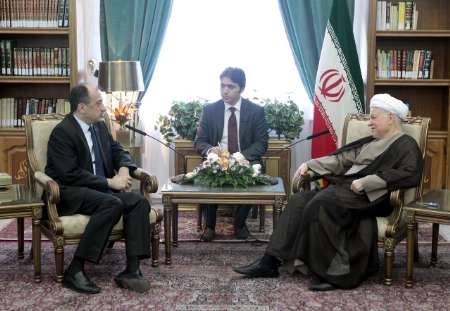ID :
333766
Mon, 06/30/2014 - 07:58
Auther :
Shortlink :
https://oananews.org//node/333766
The shortlink copeid
Rafsanjani: Disharmony Among Regional Countries Best Opportunity For Extremists

Tehran, June 30, IRNA – Disharmony among regional countries provided best opportunity for extremist groups that were in Syria yesterday, are in Iraq today, and will be in any other Islamic country, said Ayatollah Rafsanjani Sunday in a meeting with Turkey’s ambassador.
Ayatollah Akbar Hashemi Rafsanjani, the chairman of the Expediency Council, said that the extremist groups are disturbing the peace and stability of the region and defaming the true Muslims in the eyes of the world public opinion.
“If the regional countries will evaluate the present day conditions resorting to any type of mentality, they will realize that this situation is harmful for everyone,” he said.
The Expediency Council chairman elaborated on the shape taking of the Taliban and Al Qaeda both in the cradle of the western countries and the United States.
“Later on the same Taliban and Al Qaeda groups became the West’s own fierce enemies and in the future this ISIS terrorist grouplet that is committing crimes in Iraq today will begin disturbing the security of the countries that are supporting it today,” said the EC chairman.
He said that terrorism has become a global phenomenon in this historical period and the governments must disregard their short-term interests in the region and be united in the campaign against the terrorists that deprive everyone in the region of peace and security.
Hashemi Rafsanjani said that the present day conditions in Egypt, Libya, Yemen, Syria, and somehow also in Iraq and Afghanistan show how the people hate extremism.
“When the people who used to protest in the streets against the dictators were faced with the policies of the extremists, they once again sought safe havens in the camps of the militants,” he said.
Iran-Turkey relations
The Expediency Council chairman said that Iran and Turkey have a unique opportunity today for further expansion and deepening of their bilateral relations and cooperation due to various factors other than their neighborhood.
“It is not appropriate for two countries with deep-rooted historical relations to permit political developments to overshadow their ties,” he said.
The former Iranian president said that the Iran-Turkey border is merely a geographical agreement, arguing, “The numerous religious, cultural, and linguistic commonalties of the peoples of the two countries on the two sides of the border are so great that the terrorist acts are incapable of disturbing them.”
Referring to the background of cooperation between Iran and Turkey, he said, “During the government of the late Mr. Erbakan when the Islamic countries had gathered in Turkey in the framework of the D8 countries to establish it, we had agreed that cooperation with the Central Asian countries will be even beyond the economic and cultural issues.”
The Expediency Council chairman expressed sorrow that those programs were not pursued.
A bitter period in Islamic history
The Turkish ambassador to Iran Lumit Yardim, too, said that the present day conditions mark a “bitter period in the Islamic history”, arguing that if an appropriate political strategy will not be sought the Islamic countries’ conditions will get more and more complicated.
“The status quo in Iraq is quite worrying and Istanbul’s policy both on bilateral and on regional issues is consultation and holding dialogue with Iran, because we believe there is a very broad spectrum of issues before the two countries for thorough consideration,” he said.
The Turkish ambassador meanwhile elaborated about his affiliated government’s plans for expansion of cooperation with Iran.
He also referred to Ayatollah Rafsanjani’s role in the establishment of the D8, which he said was a good platform for cooperation among the developing Islamic countries.
“Unfortunately, cooperation has been replaced with disputes and enmities today,” he added./end





